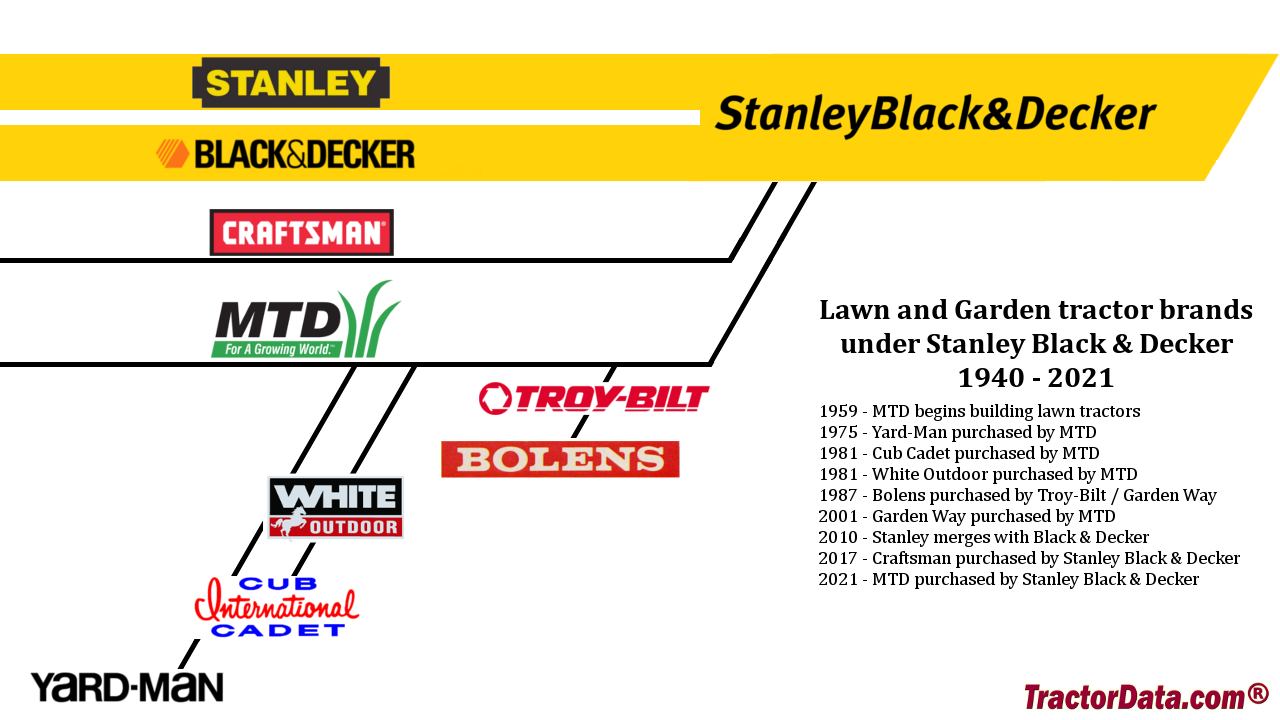Stanley purchases MTD
Stanley -Stanley Black & Decker announced that it has agreed to acquire the remaining 80 percent ownership stake in MTD Holdings Inc. ("MTD"), including Cub Cadet and Troy-Bilt, for $1.6 billion in cash. Stanley current owns the Craftsman brand. Stanley Black & Decker acquired a 20 percent stake in MTD in 2019.
"We have worked directly with MTD over the last 3 years and have been impressed with the quality of the management team, their talented employees and MTD's relentless dedication to innovation in the outdoor space," said Stanley Black & Decker's CEO James M. Loree. "The combination of businesses will create a global leader in the $25 billion and growing outdoor category, with strong brands and growth opportunities that align with two market trends driving our business - the consumer reconnection with the home and garden and electrification. We have clearly identified multiple levers to drive growth and margin expansion and are looking forward to welcoming MTD's 7,500 employees to our Stanley Black & Decker family."
MTD's Chairman, CEO and President Robert T. Moll said, "My grandfather founded MTD nearly 90 years ago, and I'm as proud of our history as I am excited about our future with Stanley Black & Decker. Both companies are proven leaders in our respective industries with iconic brands, world class capabilities and a passion for bringing new and innovative products to our consumers. I know we are partnering with an organization that will continue to deliver on our purpose of inspiring people to care for and enjoy the outdoors."
With over $2.5 billion of revenue in the last twelve months, MTD designs, manufactures and distributes lawn tractors, zero turn mowers, walk behind mowers, snow blowers, residential robotic mowers, handheld outdoor power equipment and garden tools for both residential and professional consumers under well-known brands like Cub Cadet and Troy-Bilt. MTD has state-of-the-art manufacturing facilities in North America and Europe, and a global distribution network.
 Together Stanley Black & Decker and MTD have a compelling pathway to introduce new and innovative products for professional and residential outdoor equipment customers. MTD has made significant progress in improving its EBITDA margin from 4.5% in 2018 to high single digits over the last twelve months and there is runway for further EBITDA margin improvement to the mid-teens over the next four years as cost and revenue opportunities are realized.
Together Stanley Black & Decker and MTD have a compelling pathway to introduce new and innovative products for professional and residential outdoor equipment customers. MTD has made significant progress in improving its EBITDA margin from 4.5% in 2018 to high single digits over the last twelve months and there is runway for further EBITDA margin improvement to the mid-teens over the next four years as cost and revenue opportunities are realized.
The Company expects the transaction to result in cumulative annual cost synergies of approximately $100 million by 2025. Our planning assumption for 2022 carries revenue of approximately $2.6 billion and consolidated adjusted EBITDA over $230 million. Using these assumptions, the acquisition is expected to be approximately $0.50 accretive to adjusted earnings per share in 2022, increasing to over $1.00 by 2025. One time charges associated with the acquisition are expected to be $175 - $200 million of integration, restructuring and other deal related costs and approximately $125 - $150 million of non-cash charges such as inventory step-up, which in the aggregate will largely be incurred upon closing and during the first three years of ownership. The total purchase price represents an adjusted LTM EBITDA multiple of approximately 8x.
Donald Allan Jr., President and CFO, commented, "The acquisition of MTD creates a multi-year roadmap for organic revenue, profitability and cashflow growth. We expect to generate significant revenue synergies as we capitalize on the two companies' collective technology investments, strong brands and global customer relationships. We have significant balance sheet flexibility supported by strong free cash flow generation to fund the MTD acquisition and to consider other capital deployment opportunities. We are excited to begin the next phase of our journey with MTD to realize these benefits, deliver high-teens return on capital, and build an innovative outdoor products leader."

The acquisition, which is subject to regulatory approvals and customary closing conditions, is expected to close in 2021 and will be funded with a combination of cash on hand and proceeds from debt incurrence, which we expect to include support by new credit facilities.
